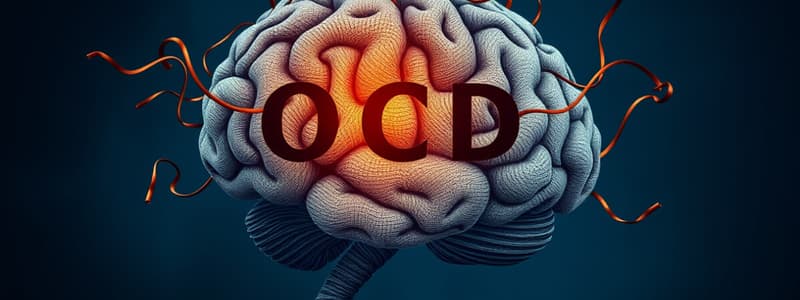Podcast
Questions and Answers
If John spends eight hours a day checking that electrical appliances in his house are switched off, he is:
If John spends eight hours a day checking that electrical appliances in his house are switched off, he is:
- being obsessive (correct)
- being overly cautious
- showing poor insight into his behaviour
- distracting himself from unwanted impulses
- being compulsive
Which of the following is not recognised as a possible trigger of OCD?
Which of the following is not recognised as a possible trigger of OCD?
- Failure to inhibit 'behavioural macros' triggered by internal or external stimuli
- Behavioural responses driven by the desire to reduce threat
- Misinterpretation of intrusive thoughts
- Fearful, obsessive or intrusive thoughts that are ignored and left untreated
- Differences in the caudate nucleus and the basal ganglia (correct)
According to Australian research, what is a common element of obsession in individuals with OCD in the Australian population?
According to Australian research, what is a common element of obsession in individuals with OCD in the Australian population?
- Fire, robbery or being assaulted
- All of the listed options are correct (correct)
- Being contaminated by germs
- Acting on an impulse such as stabbing a friend
- Losing one's mind
Trichotillomania is:
Trichotillomania is:
Obsessive-compulsive disorder has a prevalence rate of about:
Obsessive-compulsive disorder has a prevalence rate of about:
Diana is concerned about her physical appearance. She constantly thinks that her body is the wrong shape and size, despite having had cosmetic surgery. Diana is displaying signs of:
Diana is concerned about her physical appearance. She constantly thinks that her body is the wrong shape and size, despite having had cosmetic surgery. Diana is displaying signs of:
According to the DSM-5, the presence of OCD is diagnosed using which criteria?
According to the DSM-5, the presence of OCD is diagnosed using which criteria?
Based on research evidence, which of the following is more likely to result in PTSD?
Based on research evidence, which of the following is more likely to result in PTSD?
Attempts to prevent PTSD with early intervention have been challenged by:
Attempts to prevent PTSD with early intervention have been challenged by:
For posttraumatic stress disorder, the treatment with the best long-term outcome according to randomised controlled trials is:
For posttraumatic stress disorder, the treatment with the best long-term outcome according to randomised controlled trials is:
In the psychological treatment of PTSD, which of the following is a component of cognitive behaviour therapy for PTSD?
In the psychological treatment of PTSD, which of the following is a component of cognitive behaviour therapy for PTSD?
In the treatment of PTSD, which pharmacological therapy has been shown to be effective in reducing symptoms?
In the treatment of PTSD, which pharmacological therapy has been shown to be effective in reducing symptoms?
Which of the following options is not an example of a re-experiencing symptom of PTSD?
Which of the following options is not an example of a re-experiencing symptom of PTSD?
Which of the following is a change to the PTSD diagnosis in the DSM-5?
Which of the following is a change to the PTSD diagnosis in the DSM-5?
Aaron Beck's cognitive theory of depression suggests that in individuals with depression:
Aaron Beck's cognitive theory of depression suggests that in individuals with depression:
An Australian research team has argued for a subtyping model with three broad classes of depressive disorders: psychotic, melancholic and non-melancholic. Which of the following are theorised to be primarily biologically based?
An Australian research team has argued for a subtyping model with three broad classes of depressive disorders: psychotic, melancholic and non-melancholic. Which of the following are theorised to be primarily biologically based?
Behavioural theories of depression focus on the environmental conditions and contingencies and suggest that depression is maintained because of:
Behavioural theories of depression focus on the environmental conditions and contingencies and suggest that depression is maintained because of:
Within six months following treatment, approximately what percentage of people with major depression will experience recovery?
Within six months following treatment, approximately what percentage of people with major depression will experience recovery?
A major depressive disorder with melancholy has all of the following features except:
A major depressive disorder with melancholy has all of the following features except:
What percentage of people with a major depressive disorder also experience significant anxiety symptoms?
What percentage of people with a major depressive disorder also experience significant anxiety symptoms?
Which of the following is not a specifier to major depressive disorder?
Which of the following is not a specifier to major depressive disorder?
The association between depression and physical/medical illness is not explained by:
The association between depression and physical/medical illness is not explained by:
The instability model of bipolar disorder relapse assumes four mechanisms that trigger relapse. They include all of the following except:
The instability model of bipolar disorder relapse assumes four mechanisms that trigger relapse. They include all of the following except:
Which of the following is not typically associated with a manic episode?
Which of the following is not typically associated with a manic episode?
Bipolar disorder is commonly comorbid with several other psychiatric illnesses, except:
Bipolar disorder is commonly comorbid with several other psychiatric illnesses, except:
The goal dysregulation model suggests that mania is the result of:
The goal dysregulation model suggests that mania is the result of:
Pharmacological treatments for bipolar disorder vary according to:
Pharmacological treatments for bipolar disorder vary according to:
Which of the options listed is a common measure of state/trait anxiety in Australia?
Which of the options listed is a common measure of state/trait anxiety in Australia?
With regards to bipolar I disorder:
With regards to bipolar I disorder:
For a diagnosis of bipolar disorder, a person must have experienced at least one:
For a diagnosis of bipolar disorder, a person must have experienced at least one:
Flashcards are hidden until you start studying
Study Notes
Obsessive-Compulsive Disorder (OCD)
- Spending excessive time checking appliances may indicate obsessive behavior or compulsiveness.
- Common triggers for OCD include misinterpretation of intrusive thoughts, brain structure differences, ignored obsessive thoughts, and behavioral responses to perceived threats.
- Australian research highlights common obsessions in OCD, including fears of contamination, violence, and fears of losing control.
Trichotillomania and Related Disorders
- Trichotillomania involves compulsively pulling out one’s own hair and is linked to managing anxiety or negative emotions.
- Body Dysmorphic Disorder features excessive concern about body image despite cosmetic alterations.
Prevalence and Diagnosis
- OCD has a prevalence rate of approximately 2–3%.
- DSM-5 criteria for OCD diagnosis include obsessions and/or compulsions that significantly interfere with social, occupational functioning, and cause distress.
Post-Traumatic Stress Disorder (PTSD)
- PTSD is more likely after interpersonal trauma compared to natural disasters or accidents.
- Early intervention for PTSD prevention is challenged due to variations in trauma, low PTSD development rates, and natural recovery processes.
PTSD Treatment
- Prolonged exposure therapy shows the best long-term outcomes in treating PTSD.
- Cognitive Behavioral Therapy (CBT) for PTSD includes components such as psychoeducation, anxiety management, cognitive restructuring, and imaginal exposure.
- Effective medications for reducing PTSD symptoms include selective serotonin reuptake inhibitors.
PTSD Symptoms
- Notable re-experiencing symptoms of PTSD include intrusive memories, flashbacks, nightmares, and reliving events.
- Avoidance is not classified as a re-experiencing symptom.
Changes in PTSD Diagnosis (DSM-5)
- The DSM-5 includes acute stress disorder and modifies criteria for PTSD categorization, allowing for broader definitions of trauma reactions.
Depression Theories
- Aaron Beck’s cognitive theory posits that negative cognitions cause depressive symptoms.
- Behavioral theories emphasize the role of reduced opportunities for positive reinforcement in maintaining depression.
Recovery and Comorbidity
- Approximately 50% of individuals with major depression experience recovery within six months post-treatment.
- Major depressive disorder often coexists with anxiety disorders.
Major Depressive Disorder Features
- Melancholic features of major depression include an inability to experience pleasure, early-morning waking, excessive guilt, and significant weight loss.
Bipolar Disorder
- Bipolar disorder is associated with manic states characterized by inflated mood, grandiosity, and risk-taking behaviors.
- Common comorbidities of bipolar disorder include anxiety disorders, OCD, PTSD, and schizophrenia.
- The goal dysregulation model suggests that mania results from excessive goal engagement.
Treatment Variability
- Treatment strategies for bipolar disorder depend on whether the patient is in an acute or maintenance phase.
State/Trait Anxiety Measurement
- A common measure of state/trait anxiety in Australia includes the Behavioral Inhibition Scale/Behavioral Activation Scale (BIS/BAS).
Gender Differences in Bipolar Disorder
- Bipolar I disorder shows equal prevalence among men and women, with factors influencing diagnosis including manic or hypomanic episode history.
Studying That Suits You
Use AI to generate personalized quizzes and flashcards to suit your learning preferences.




